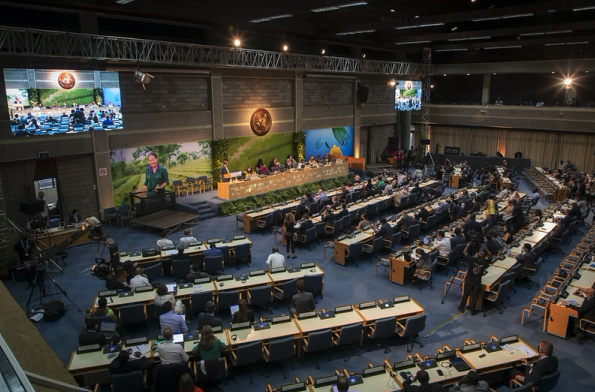- The resolution to end plastic pollution was adopted by the resumed 5th Session of the UN Environment Assembly (UNEA 5.2) in Nairobi unanimously by all member states, with resounding acclamation and standing ovations.
Hosted by the UN Environment Programme, the United Nations Environment Assembly (UNEA) brings together representatives of the 193 Member States of the UN, businesses, civil society and other stakeholders to agree on policies to address the world’s most pressing environmental challenges.

The resumed fifth session of the UNEA-5.2 took place online and in Nairobi from 28 February – 2 March 2022. Image credit: UNEP
“South Africa welcomes the adoption of the resolution to “end plastic pollution: towards an international legally binding instrument” This represents an important landmark and significant decision to protect the environment and particularly our oceans that are important for food security, addressing climate change, improving the health and promoting sustainable development and poverty eradication,” said Minister of Forestry, Fisheries and the Environment, Ms Barbara Creecy.
Member states have recognized that urgent further international action is needed by developing an international legally binding instrument on plastic pollution, including in the marine environment. An intergovernmental negotiating committee (INC) will be constituted commencing its work during second half of 2022, with the ambition of completing by the end of 2024.
The instrument which could include both binding and voluntary approaches would be based on a comprehensive approach that addresses the full lifecycle of plastic, taking into account the principles of the Rio Declaration on Environment and Development, as well as national circumstances and capabilities. Critical to implementation for developing countries will be the need for means of implementation namely finance, technology and capacity.
Additional to this milestone resolution UNEA also decides to establish a science policy panel that would contribute further to the sound management of chemicals and waste and to prevent pollution as well as to continue and strengthen support for the Strategic Approach to International Chemicals Management.
At the event Creecy confirmed that South Africa, unlike other country’s in Africa like Kenya and Uganda, will not ban single-use plastic.
“South Africa will actively engage in the future multilateral negotiations on plastics pollution with the view to ensuring that we not only have and ambitious and robust instrument but that the needs of developing countries and in particular the special needs and circumstances of Africa are firmly anchored within,” said Creecy.
Author: Bryan Groenendaal















